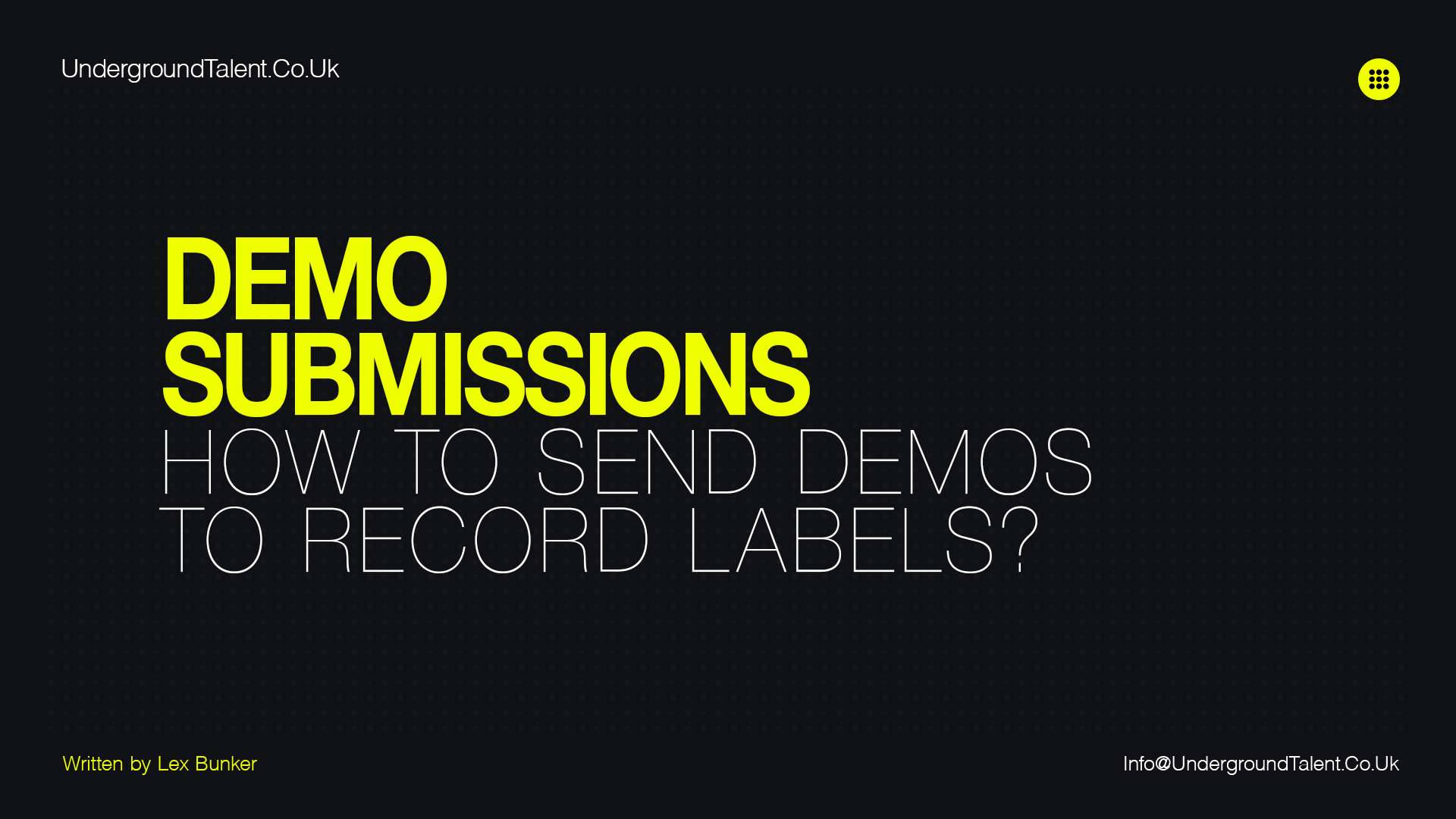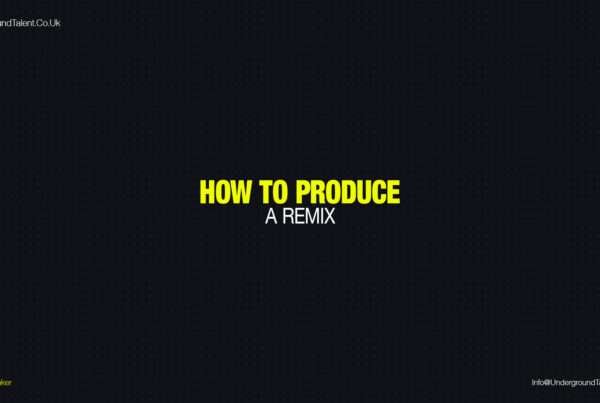Demo Submissions: Table of contents
- Introduction
- Understanding Record Labels
- Key Steps and Common Mistakes
- How to Submit Music to Labels?
- Techniques to Make Your Tracks Stand Out
- Self-Promotion for Techno Artists
- What You Need to Know Before Submitting Your Demo
- Music Industry Networking in the Techno Scene: Building Relationships
- Successful Demo Submissions: Conclusion
Don’t Miss: Rave In London? Rave Responsibly.
Demo Submissions: Introduction
In this article, we will discuss demo submissions to techno labels. Navigating the world of music can be a complex task, particularly when it comes to getting your work noticed by record labels. This is especially true in the vibrant and competitive field of techno music. One of the most crucial steps in this journey is the process of demo submissions.
A well-crafted, thoughtful demo submission can be the key that unlocks the door to the next stage of your career. This guide is designed to help techno artists understand the ins and outs of submitting demos to record labels, providing valuable insights to help you stand out in the crowd and make a lasting impression. Let’s dive into the world of successful demo submissions and how they can elevate your career in the techno music industry.
Download Free: Techno Sample Pack: 64 One-Shot Samples + Producers Tips
Understanding Record Labels: What Are They Looking For?
Independent Record Labels, and specifically techno labels, operate without the backing of the major record companies.
They’re crucial in the music industry as they provide opportunities for unsigned artists to break into the scene. Independent labels tend to be more artist-focused, offering a more personalized approach to promotion and development. They can be genre-specific or versatile, and they often prioritize artistic integrity over commercial success. This gives artists more creative control, but it also means the labels are looking for a specific type of talent.
When considering music demo submissions, independent record labels typically look for unique, original sounds and strong songwriting skills. They’re drawn to artists who have a clear artistic vision and a solid understanding of their musical identity. In addition to musical talent, indie labels often look for artists who demonstrate an understanding of the music business and a willingness to participate in self-promotion.
They value artists who are actively building their brand and engaging with their audience. Remember, an indie label may not have the same resources as a major label, so artists who can contribute to their own success are particularly attractive.
Don’t Miss: Techno Events: How to Plan & Organize the Perfect Techno Party
Demo Submissions: Key Steps and Common Mistakes
The process of music demo submission to independent record labels involves several key steps and potential pitfalls. The initial step is to research and identify the labels that align with your music genre and artistic vision. This involves understanding their roster of artists, their style preferences, and their submission guidelines.
It’s crucial to tailor your demo to the specific label you’re targeting. A common mistake many artists make is sending the same generic demo to multiple labels. Remember, each label is unique and what works for one might not work for another.
When recording demos for labels, ensure that the quality of the recording is high. The songs should be well-mixed and mastered, showcasing your talent in the best possible light. Present your best and most representative work, rather than an assortment of tracks that lack coherence.
Another common mistake is failing to include contact information and a short, compelling bio. Labels receive numerous submissions, so it’s essential to make it easy for them to contact you if they’re interested. In your bio, highlight your musical journey, notable achievements, and why you believe you’re a good fit for the label. Lastly, be patient and professional. It might take time to hear back from a label, but persistence and professionalism can increase your chances of getting signed.
Don’t Miss: Techno Loops V1: High-Quality Analog Loops for Music Production
Demo Submission: How to Submit Music to Labels?
Here’s a simplified step-by-step guide to help you navigate the process of submitting music to labels:
- Research: Identify labels that fit your music genre and style. Look into their artist roster and submission guidelines.
- Prepare Your Demo: Record high-quality tracks that represent your style and talent. Limit your demo to your best 3-4 tracks.
- Create a Press Kit: This should include a short bio, press photos, links to your music, and any notable achievements or press coverage.
- Write a Cover Letter: Introduce yourself and explain why you’re a good fit for the label. Keep it concise and compelling.
- Submit: Follow the label’s submission guidelines closely. Some may prefer digital submissions while others might accept physical copies.
- Follow-Up: If you haven’t heard back after a few weeks, it’s okay to send a polite follow-up email.
Submitting music to labels requires a strategic approach. It’s not just about sending your music; it’s about presenting yourself as a professional artist who understands the industry. The first step is thorough research. You need to understand the labels you’re targeting, their ethos, their artist roster, and most importantly, their submission guidelines.
This research will guide the music you choose for your demo and the way you present yourself in your cover letter and press kit.
In the process of preparing your demo, quality should be your priority. Independent record labels receive numerous submissions, and the best way to stand out is by showcasing your talent through high-quality recordings.
Your demo should be limited to your best tracks, typically around three to four, that best represent your style and musical abilities. When you submit your music, ensure you follow the label’s guidelines to the letter. Some might prefer digital submissions, while others may still accept physical copies.
Following their preferred submission method shows respect for their process and increases your chances of being listened to. And finally, don’t forget to follow up. It can take time for labels to review submissions, but a polite follow-up email can demonstrate your seriousness and commitment.
Don’t Miss: How to Stop Procrastinating & Finish Your Tracks?
Demo Submissions: Techniques to Make Your Tracks Stand Out
Here are a few techniques to help your techno music stand out when recording demos for labels:
- Quality Recording: Invest in good recording and production software or professional studio time to ensure your music sounds its best.
- Track Selection: Choose your most unique and compelling tracks that showcase your style and talent in techno.
- Tight Arrangement: Techno music thrives on repetition and subtle changes – make sure your songs are well-structured and engaging from start to finish.
- Good Mix: Balance your tracks properly so that all elements, particularly the kick drum and bass line, can be heard clearly.
- Mastering: This final polishing step can make your techno tracks sound more professional and cohesive.
- Signature Sound: Develop a unique sound that can make you stand out in the techno scene.
When creating demos for techno labels, the quality of your recording is paramount. Techno is a genre where the subtleties in production can make a significant difference, so investing in professional recording equipment, software or studio time is crucial. Be selective with your track choice. Opt for tracks that best represent your style and abilities within the techno genre, and remember that uniqueness is key.
In terms of the arrangement, techno music thrives on repetition with subtle changes over time – your tracks should be engaging and have a clear structure. Balance your mix properly, ensuring the kick drum and bass line, the heart of any techno track, are prominent and clear. This demonstrates your understanding of techno music production and your attention to detail.
Finally, developing a signature sound can help set you apart from other artists. This could be a unique synth sound, a particular way of arranging your tracks, or even a specific style of kick drum. Having a recognisable sound can make you stand out to techno labels, helping you to catch their attention in the sea of submissions they receive.
Read Also: Techno Sample Pack: Unleash Your Creativity with Techno Shots
Self-Promotion for Techno Artists: Building Your Brand Before Approaching Labels
For techno artists, self-promotion is a crucial aspect of building a successful music career. Before even considering approaching independent techno record labels, artists should be actively working to establish and grow their personal brand. This involves creating a strong online presence, regularly releasing quality music, and engaging with fans and other artists in the techno scene.
Social media platforms, music streaming services, and websites like SoundCloud or Bandcamp can be effective tools for reaching a wider audience. It’s also important to play live shows, either in person or virtually, to showcase your skills as a performer and connect with your audience on a deeper level.
In the process of building your brand, consistency and authenticity are key. Your brand should be a true reflection of your identity as a techno artist, helping you stand out in the crowded music scene. Make sure your branding is consistent across all platforms, from your social media profiles to your album artwork.
This helps create a memorable image in the minds of fans and industry professionals alike. Remember, labels are not just looking for talented artists; they’re looking for artists who have a clear vision, a strong work ethic, and the potential to draw in listeners. By effectively promoting yourself, you can demonstrate these qualities and increase your chances of catching the attention of techno record labels.
Read Also: How to Promote Electronic Music | 10 Ways For Beginners
Demo Submissions: What You Need to Know Before Submitting Your Demo
When you’re preparing to submit your demo to a techno record label, understanding their acceptance criteria is critical. This includes both the quality of the music and the format in which it’s submitted. The first aspect, quality, refers to both the production value of your tracks and their creative originality. Techno labels are looking for artists with unique sound that fits within the broad genre of techno but stands out in the crowded market.
On the technical side, labels typically look for demos that include 3-4 tracks. This is often the ideal length for an EP in the techno genre, providing a good showcase of your sound without overwhelming the listener. Submitting just one track can limit your chances as it doesn’t show the breadth of your talent while sending too many (like 20 tracks) can be excessive and might not be listened to in its entirety.
Moreover, labels often prefer uncompressed audio files, such as WAV or AIFF, as these provide the highest sound quality. It’s also crucial to label your tracks correctly with your artist name and the track title. In addition to the music itself, labels want to see a certain level of professionalism in the presentation and format of your demo.
Finally, it’s important to understand that each label may have its own specific submission guidelines. These can include preferred submission methods (like email or a music submission platform), specific file formats, and any additional materials they want to see, like a press kit or a short bio. Always make sure to check these guidelines before submitting your demo to ensure you’re giving your music the best possible chance of being considered.
Don’t Miss: Audio Mastering: How to Prepare Your Tracks for Mastering?
Music Industry Networking in the Techno Scene: Building Relationships
Networking is an integral part of building a successful career in the techno music industry. Building relationships with other artists, producers, promoters, and label representatives can provide invaluable opportunities and insights, helping you navigate the industry and grow your career.
One of the best ways to network in the techno scene is by attending events, both online and offline. Music festivals, gigs, conferences, and industry meet-ups are all great places to connect with others in the industry. Don’t be shy about introducing yourself and expressing genuine interest in others’ work. When attending such events, remember that everyone is there for the love of music. Be respectful, listen attentively, and show appreciation for others’ work.
Online platforms also offer significant networking opportunities. Social media, music forums, and platforms like SoundCloud and Bandcamp can help you connect with other artists and industry professionals worldwide. Join online groups and communities focused on techno music, engage in discussions, and share your work.
When networking, remember that it’s about building genuine relationships rather than just promoting your music. Be supportive of others, offer help when you can, and be open to collaboration. This can lead to opportunities like remixing other artists’ tracks, playing at events, or even signing with a label.
Lastly, keep in mind that networking is a long-term investment. It may take time to build relationships and see the benefits. But with patience, persistence, and a genuine love for techno music, networking can significantly help advance your career in the techno scene
Read Also: 7 Music Industry Tips for Successful Networking
Successful Demo Submissions: Conclusion
Achieving a successful techno demo submission is no small feat, but with strategic planning, attention to detail, and a deep understanding of the music industry, you can increase your chances significantly. The process begins with high-quality, well-produced tracks that embody your unique sound as a techno artist. This not only appeals to listeners but also showcases your professionalism and dedication to your craft.
After curating your best work, your next step is to identify techno record labels that align with your style and aspirations. Comprehend their roster, their music, and their submission guidelines meticulously. When you submit your demo, tailor it to their guidelines, including a compelling cover letter, your contact information, and relevant links.
Patience is a virtue in this process. It may take weeks, even months, for labels to review your submission due to the high volume of demos they receive. If you haven’t received feedback after a few weeks, a polite follow-up email could be considered. However, persistence should not cross over into impatience or pushiness.
Remember, rejection is an integral part of the journey. It’s not a reflection of failure, but rather an opportunity for growth and refinement. Many successful artists experienced multiple rejections before landing their first record deal. Any feedback received should be used constructively to enhance your music and your approach.
In conclusion, refining your sound, enhancing your skills, and forging connections within the techno music scene is fundamental to your journey. A successful demo submission might not happen overnight, but with persistence, dedication, and a love for techno, your music can find its rightful place in the industry.
Don’t Miss: Techno Sequences for u-He Diva. Designed by Erald.
Connect with Underground Talent
You can find us on Facebook, Soundcloud, and Instagram. We encourage you to share your thoughts and feedback on this article, and we look forward to continuing to educate and inform you on this important topic. You can find us on, and, and don’t hesitate to reach out to us if you have any questions or comments by email at info@undergroundtalent.co.uk.
Don’t miss out on the latest and greatest underground talent! Subscribe to our YouTube channel now and stay on top of the freshest and most exciting new acts in the techno scene. Click the subscribe button and join our community of techno music lovers today!
Read Also: Top 20 Female Techno DJs Dominating the Electronic Music Scene
And Always Remember…
Have Fun & Be Creative!





